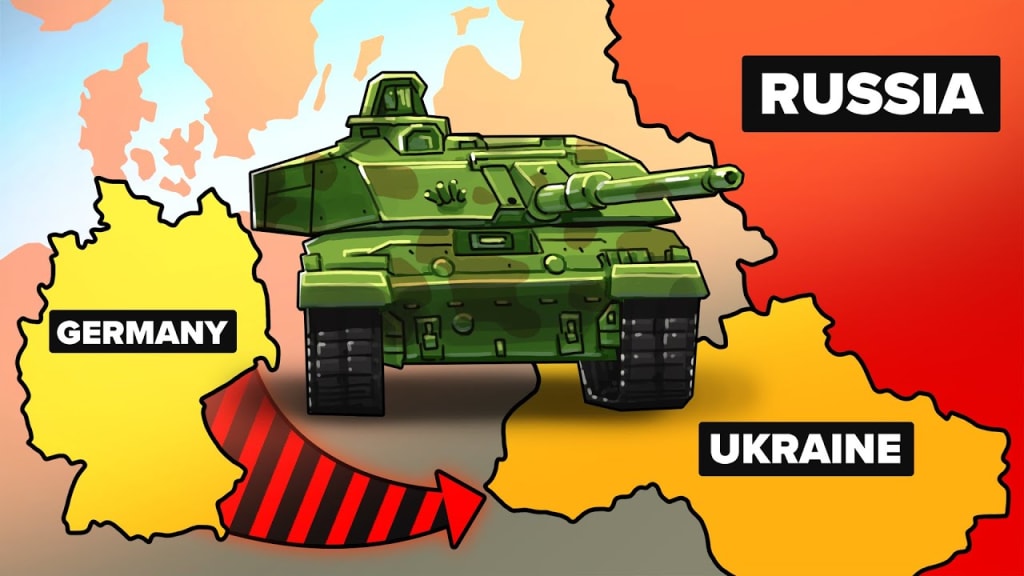Why Did Germany Almost Not Deploy Tanks to Ukraine?
Following weeks of delays, continual changing of the goalposts, and downright lying, Germany appears to have agreed to furnish Ukraine with the tanks it sorely needs for the forthcoming spring and summer battle seasons. Yet, why was Germany so hesitant to send tanks in the first place? 🤐🤐😲😲❕❕

Following weeks of delays, continual changing of the goalposts, and downright lying, Germany appears to have agreed to furnish Ukraine with the tanks it sorely needs for the forthcoming spring and summer battle seasons. Yet, why was Germany so hesitant to send tanks in the first place? 🤐🤐😲😲❕❕
After weeks of delays, constant shifting of the goal posts, and outright lies, it appears that Germany is finally agreeing to provide Ukraine with the tanks it desperately needs for the upcoming spring and summer fighting seasons. However, why in the world was Germany so afraid to send over tanks in the first place? Ukraine needs tanks if it is to continue successfully rebuffing the Russian invasion. However, if it wants to have any chance of actually driving Russia off its soil or retaking Crimea, it desperately needs tanks. Since the beginning of the war, armored fighting vehicles have been at the top of the list of desired foreign aid. But until the beginning of the New Year, the west was hesitant to provide Ukraine with powerful military hardware. Initially, it was a matter of caution because it would be ineffective to supply Ukraine with weapons that would only be lost during a quick Russian victory.
In order to equip Ukraine to wage a guerilla war against the Russian occupiers, the West concentrated on developing man-portable air defense and anti-tank systems. Nevertheless, with its success in defending Kiev, Ukraine shocked the west. After the speed at which it disintegrated in Crimea during the Russian invasion of 2014, it came as a surprise that the Zelensky government did not fall as anticipated and that the Ukrainian army remained cohesive and capable of long-term combat operations. This altered their thinking, and many in the west began to demand that Ukraine be given access to more powerful and sophisticated combat systems. The US would first send HIMARS and then swiftly send even more cutting-edge technology. But there is now a turning point in the Ukraine conflict.
Although Russia's military has shown itself to be weaker than Ukraine's, it still has a sizable overall advantage. Even though its equipment isn't all that great, it has much deeper inventories of both than Ukraine. Stalin's adage, "Quantity is a quality all its own," holds true when fighting an opponent who lacks a sizable supply of modern equipment. Ukraine urgently needs tanks. There isn't much time left as of the writing of this narrative for Ukrainian crews to receive western tank training in time to fend off a Russian spring offensive. Ukraine is running out of time, and Germany refused to back down when the NATO defense ministers discussed sending tanks to Ukraine. But after five days, it seems as though the nation has finally come to its senses and decided to provide Ukraine with tanks. However, retaliation was quick, as just a few days later; Russia reduced its oil production by about 5.
The price hikes have an impact that can be felt all the way in the U.S., putting 75 million people and countless businesses in danger of losing power. Due to price increases, 1 in 6 Americans fell behind on their utility bills last year, taking a significant financial toll on the nation's wallets. Unbelievably, a recent survey found that more than half of Americans making six figures now live paycheck to paycheck. There is no doubt that a financial storm is brewing, and nobody is safe. Even Goldman Sachs is open about the fact that the market is at a dead end. Large institutions like Goldman, however, are also investing hundreds of millions in low-correlation assets because they can increase in value even if markets stagnate this year. Now, among these assets, ART has the lowest correlation, according to a recent report by Citibank.
Furthermore, over the past 26 years, the return on the SP 500 has more than doubled thanks to the price of contemporary art. Numerous NATO allies have a very bad taste in their mouths as a result of Germany's hesitation, with its little tank tantrum, the country that is regarded as the EU's leader has lost a significant amount of political capital. Initially, Germany outright refused to send tanks or allow any country using its Leopard 2 tanks to send them. As part of export agreements, countries purchasing German leopards aren't allowed to further export them to other countries without Germany's approval. Despite their willingness to do so, they did not have the go-ahead from Berlin to send their tanks to Ukraine. Germany claimed that it refused to provide tanks because it preferred to work as part of a coalition rather than on its own.
Poland raised its hand and said, "Cool, we're a coalition now," almost immediately. Astonishingly, Germany realized it had to reposition the goalposts after the Baltic States and other EU partners expressed their willingness to send their Leopard 2 aircraft. As soon as acting alone was no longer a concern, it decided against sending tanks on its own. Given that the Leopard 2 is the most prevalent tank in Europe and that only the US could afford to give away a portion of its force, Germany believed it had the ideal justification to dissuade NATO and the EU at this point. The Abrams, however, is a beast that devours logistics and has a gas turbine engine that uses jet fuel as opposed to its diesel engine counterparts, so doing so would be foolish and not very economical. It would be expensive and difficult to set up logistics networks and supply Ukraine with spare parts. To everyone's surprise, Britain announced that it would send 14 of its Challenger 2 tanks to Ukraine.
The amount would be sufficient for just one unit and would not significantly change the course of the war. Since the Challenger would require a lot of logistics work for a meager number of tanks, Ukrainian logisticians weren't even interested in accepting it. The real point, however, was purely symbolic: Germany was no longer in charge and no longer had to worry about not being a part of a coalition. Germany then moved the goal posts once more, as Germany is wont to do. The US had to take the initiative and give up its Abrams first because being first or having a group of tank BFFs was no longer important. No Leopard 2s and no Abrams are in Ukraine. Germany was acting like a very intelligent girl, much like the Velociraptors in Jurassic Park. It is aware that President Biden declared he wouldn't send the Abrams to Ukraine because it wouldn't make economic sense to do so and would likely delay the readiness of Ukrainian tankers until the summer, which would be far too late to counter a potential spring offensive.
It had finally shifted the goalposts far enough that it could claim to have a valid excuse for withholding tanks and shift some of the blame to America—basically a European pastime. We can only speculate, as there is no known reason for Germany's sudden change of heart over a few days. Perhaps the US reminded Germany that it had paid for its defense during the Cold Wars nearly five decades. It's possible that Germany grew weary of the rest of Europe's mockery of it. Whatever the reason, now that German tanks are on their way to Ukraine, the field is wide open for Leopard tanks to join the fight, with the American Abrams appearing to be included as well, though this has not yet been confirmed as of the creation of this narrative. The most frequently cited explanation for Germany's reluctance is one of optics: the country is very sensitive to the fact that it basically wrecked Europe twice in the 20th century, with the second time making mass murder of Jews and minorities a national hobby.
So why was Germany digging its heels in and burning through literally all of its good will with the rest of the western world? Since that time, the country has shown a strong reluctance to send military supplies to at-war nations or to engage in military action unless it is a part of a large coalition. Since the end of World War II, Germany has developed a serious aversion to hostilities, which, given its past, is probably for the best. However, the optics is particularly bad in light of the atrocities committed by the German army against Soviet forces right inside Ukraine. In massive genocidal campaigns to racialize Eastern Europe, millions of Soviet citizens were killed during the German invasion, frequently on purpose. The last thing Germany wants to picture is its tanks squaring off against Russian tanks in Ukraine's hills and fields one more time. This is a reasonable worry, but given Russia's Nazi-like atrocities in Ukraine, if Germany were looking for a conflict where it could repair its reputation and stand on the right side of history, this is it.
Russian forces have been deliberately targeting Ukrainian civilians for almost a year at this point, killing and torturing civilians and POWs, and using violence against Ukrainian women as a weapon of war. The longer Germany took to send tanks to Ukraine, the more Ukrainian soldiers and civilians died. However, there are other, very intriguing explanations for why Germany might not have sent tanks. The first of these explanations is comparable to Russia's ostensible hesitation to send the T-14 to Ukraine. Russian T-14s have reportedly been photographed in eastern Ukraine, but these images are unconfirmed, and there is no proof that the tank has actually been used in combat. Knowing Russia, the T-14 is most likely present in Ukraine, but only in a remote location far from the fighting where a few pictures can be taken for propaganda. Russia has no plans to use its most advanced tank on the actual front lines, and Germany may be wary of using the Leopard in Ukraine for the same reason.
Images of destroyed T-14s on the front lines would effectively ruin the tank's already tarnished reputation. The T-14 has a notorious history of financial and even mechanical problems. Given that a sizeable portion of Russia's economy is based on the export of weapons, this would cast serious doubt on Russia's ability to manufacture modern weapons at a time when the world is already debating whether Russian equipment is worthwhile to purchase given how poorly it competes with Western weapons. Germany exports the Leopard 2 to over a dozen countries, so if all of a sudden the Leopard 2 starts to lose to T-72s, which could also damage Germany's reputation.






Comments
There are no comments for this story
Be the first to respond and start the conversation.